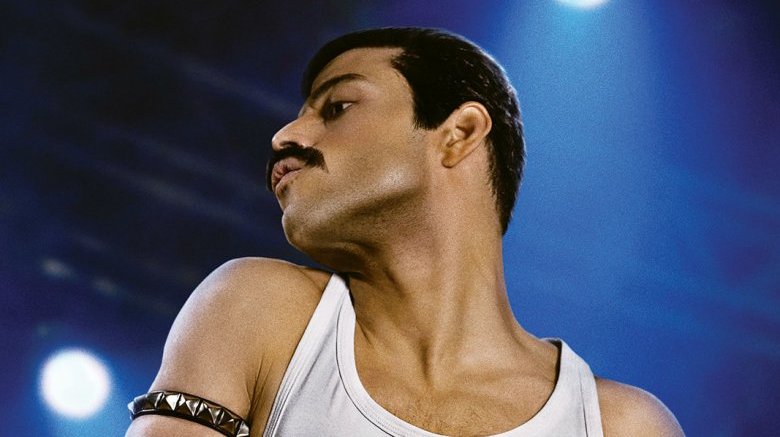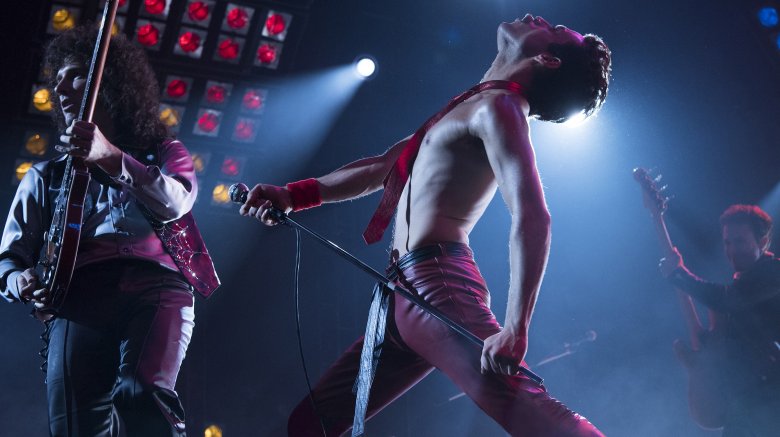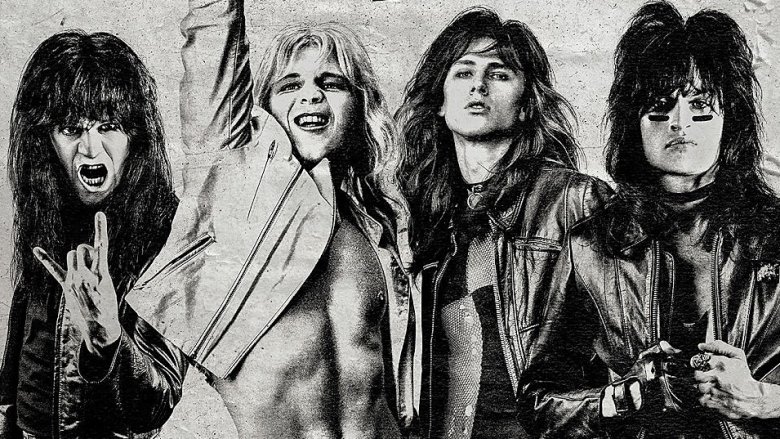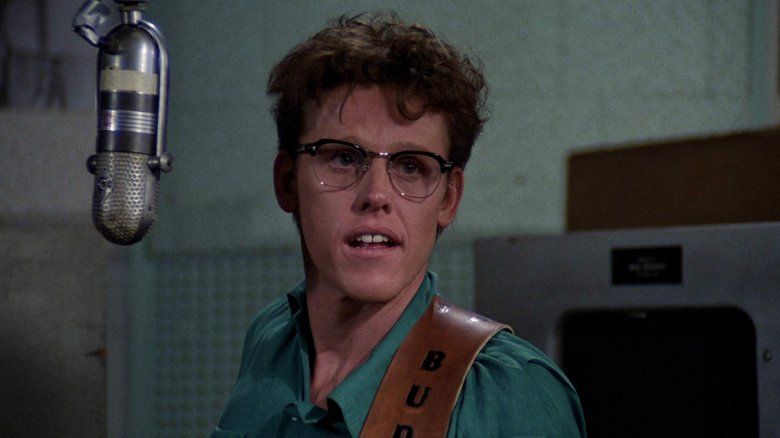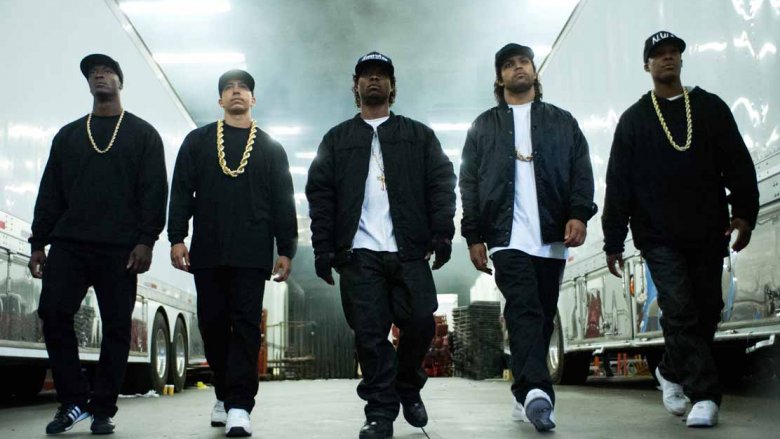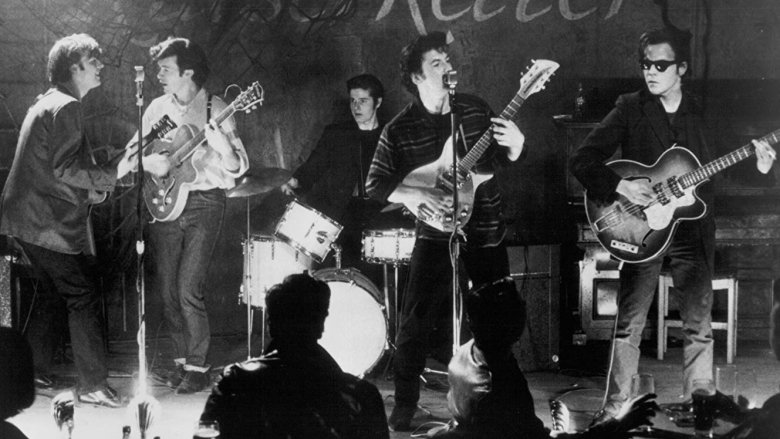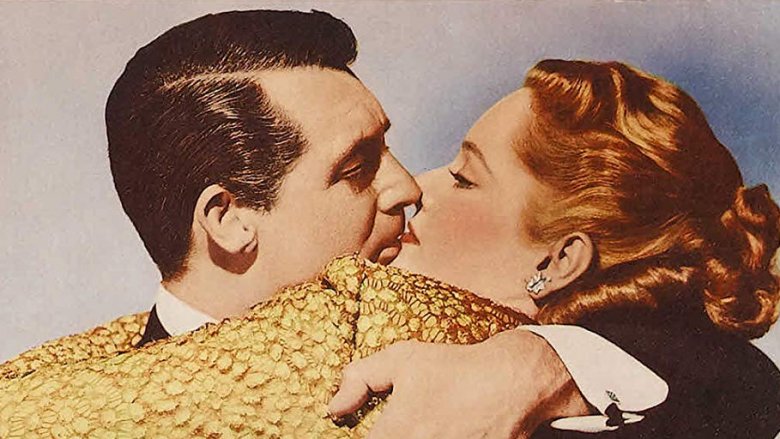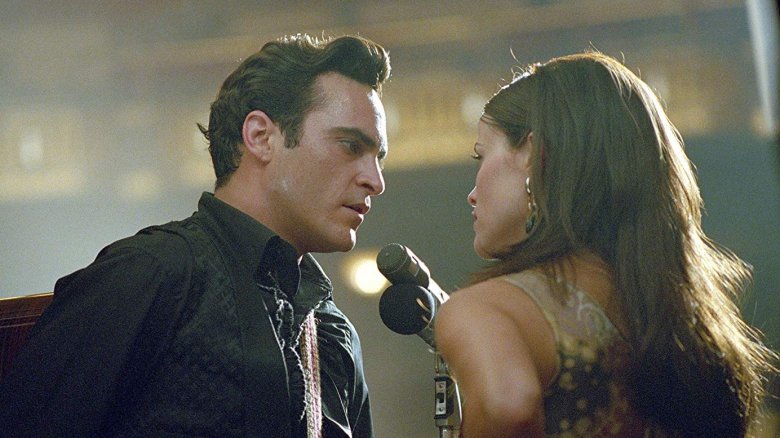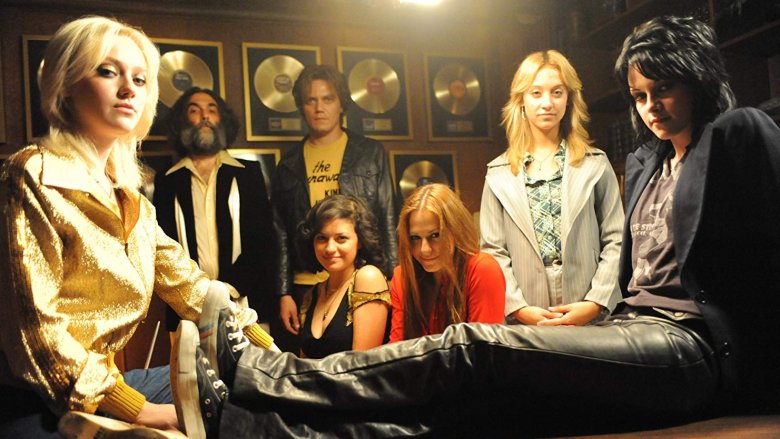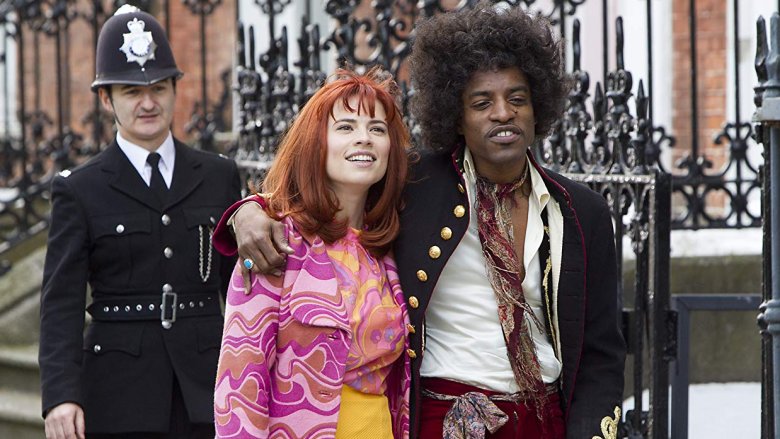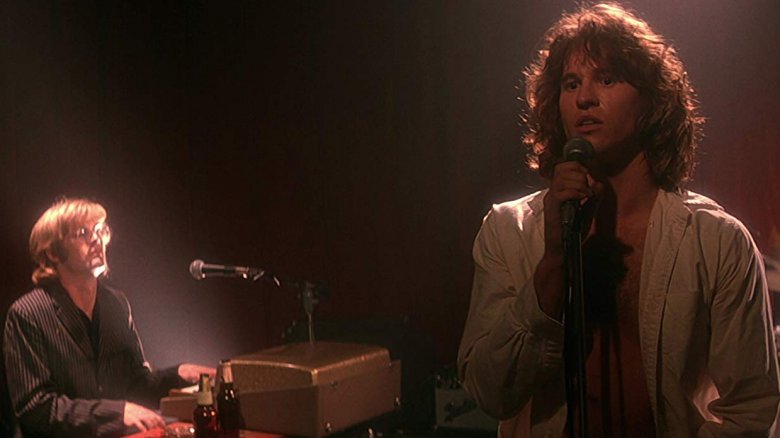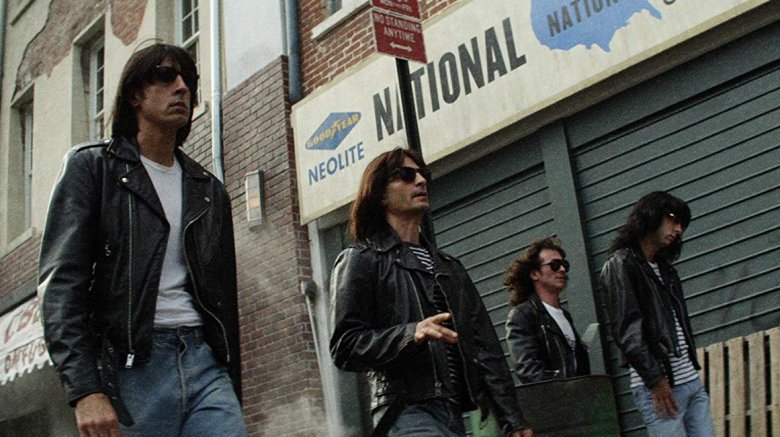Music Biopics That Lied To Your Face
The music biopic has long been a staple of the movies, and with fans always wanting an inside look at their heroes, a well-made one is usually guaranteed to be a smash hit at the box office. But trying to condense the complexities and contradictions of an artist's life into the standard two-hour film has perplexed many a filmmaker, and even the best biopics are littered with inaccuracies, revisionist history, and glossed-over details that shoehorn everything into an easily digestible, traditional narrative. Admittedly, sometimes these changes genuinely made sense, like when band members wouldn't sign away the rights to their name or when the conservative nature of the times wouldn't allow it. Below, you'll read about that and 11 other films — with its subjects all legends of rock, soul, country, hip-hop, punk and pre-rock pop — that aggravated those closest to the story and the most knowledgeable of fans, even as they helped draw in new ones. Check them all out below.
Not everyone went nuts over 'Bohemian Rhapsody'
The story of Freddie Mercury was so extraordinary that it seemed almost perfect for a big-screen adaptation. And that's why it was a shame that Bohemian Rhapsody wasn't the real life, but just fantasy. Despite what Bohemian Rhapsody told you, Freddie Mercury didn't introduce himself to Brian May and Roger Taylor after the gig in which Smile lead singer Tim Staffell quit; he already knew all three of them, and they were even roommates for a spell. The movie would also lead you to believe that John Deacon was their original bassist, although they went through three other men — Mike Grose, Barry Mitchell, and Doug Bogie — from the time they formed in 1970 until Deacon's first show in July 1971.
And then there's the treatment of Paul Prenter, Mercury's former manager. Although he's rightfully portrayed as the villain in the story, they got a lot of the details surrounding his firing wrong. For starters, the film says he was fired prior to the Live Aid concert in 1985 and then, in retaliation, went on television to out Mercury. However, the truth is that Prenter was fired in 1987 after Prenter sold his story, called "AIDS Kills Freddie's Two Lovers," in the notorious British tabloid the Sun.
'The Dirt' cleaned things up a bit
Biopics often take a bit of artistic license with the truth in order to soften the subject's image, so it may seem strange that Motley Crue, who made a career out of being unapologetically excessive, would change a few facts around for The Dirt, the film version of their notorious 2001 memoir. But strangely, the cinematic take on The Dirt gave short shrift or overlooked entirely those times when either Vince Neil or Tommy Lee weren't in the band.
And while it's logical for them to focus on the lineup with whom they made all their biggest hits, their firing of former manager Doc McGhee in the movie doesn't jibe with the official story. In the movie, Nikki Sixx gets upset when McGhee tries to reunite Sixx with his estranged mother, but in reality it was when McGhee slotted them below headliners Bon Jovi — another McGhee client — at the Moscow Music Peace Festival, which was arranged as a condition of McGhee's plea bargain for getting caught smuggling 20 tons of marijuana into the U.S. Upon learning that they were to be Bon Jovi's opening act, Lee wrote in The Dirt that he "hunted Doc down and found him backstage. I walked right up to him and pushed him in his fat little chest, knocking him over onto the ground like a broken Weeble." That was the end of that partnership, and Bon Jovi dropped him, too.
'The Buddy Holly Story' was amazing ... unless you knew Buddy Holly
The Buddy Holly Story, which featured a breakout, Oscar-nominated performance by Gary Busey as the title character, received uniformly strong reviews, except from those closest to Holly. Shortly after its 1978 release, Chet Flippo of Rolling Stone spoke with those who were slighted. Because the other two members of the Crickets, Jerry Allison and Joe B. Mauldin, had sold their rights to another studio, their names were changed to Jerry Charles and Joe Bob Simmons. Plus, Norman Petty, who produced the bulk of Holly's classic recordings, was left out of the story entirely. (This was supposedly because he wanted control over the script, though Petty denied that.) And neither Holly's mother nor his brother were happy with the way his family life was relayed, claiming the filmmakers went back on their word to consult with them.
"We were behind Buddy one hundred percent," Ella Holley said, in response to the film's depiction of her and her husband as pushing Buddy to quit rock 'n' roll. "We were very anxious for him to make a career as a singer. We were his biggest fans."
"It didn't portray his life at all, really," added Larry Holley, Buddy's brother. "They didn't ask us about a thing. It was mostly Maria Elena's version of his life. I didn't feel that was my brother up there on the screen. We weren't happy with the movie at all."
'Straight Outta Compton' was not straight outta the history books
Jonathan Herman and Andrea Berloff received an Oscar nomination for their screenplay about N.W.A., but Straight Outta Compton earned plenty of headlines for what they left out of it. Some of them came across as minor, such as the reason for Dr. Dre's arrest (for unpaid tickets rather than for defending his brother as seen in the movie) that kickstarted the hip-hop group's formation, or the time they were arrested for performing "F*ck tha Police" in Detroit (in the hotel later that night, not onstage). It also virtually ignored the contributions of founding member Arabian Prince.
Perhaps more importantly, Straight Outta Compton completely omits Dr. Dre's early history of violence against women, particularly high-profile incidents involving his girlfriend Michel'le and hip-hop television host Dee Barnes, who wrote a lengthy Gawker article about it. Barnes said she didn't necessarily want to relive the experience on-screen, but she wanted some acknowledgement that it was part of his character. "In his lyrics, Dre made hyperbolic claims about all these heinous things he did to women," she wrote. "But then he went out and actually violated women. Straight Outta Compton would have you believe that he didn't really do that. ... So which is it? You can't have it both ways. That's what they're trying to do with Straight Outta Compton: They're trying to stay hard, and look like good guys."
'Backbeat' backed away from the truth
On the whole, 1994's Backbeat is a fairly accurate portrayal of a period in the Beatles' history that doesn't get much of a spotlight: their early days woodshedding in Hamburg's red light district, with an emphasis on the relationship between John Lennon (Ian Hart), original bassist Stu Sutcliffe (Stephen Dorff) and Astrid Kirchherr (Sheryl Lee). But there's one moment in particular that made hardcore Beatles fans cringe. When Klaus Voormann tells Lennon that their show was "fun," Lennon goes off, telling him about how exhausted they are and calling it a "hard f*ckin' day's night." It's well-known that the phrase (minus the obscenity), which was used as the name for their first film and its title song, was coined by Ringo Starr, who was still two years away from joining the band. It's minor, but it wouldn't have been difficult to get it right.
Paul McCartney was also upset with how he came off in the movie. "One of my annoyances about the film Backbeat is that they've actually taken my rock 'n' rollness off me," he said. "They give John the song 'Long Tall Sally' to sing, and he never sang it in his life." The Beatles recorded the Little Richard song in 1964.
'Night and Day' had to drop anything controversial, which was a lot
The true story of songwriter Cole Porter was criminally scrubbed in 1946's Night and Day. Because of the Motion Picture Production Code, which governed what was deemed appropriate for Hollywood movies from 1930-68, Porter's homosexuality could not be shown onscreen. Instead, his real-life marriage of convenience to Linda Lee Porter, who was several years his senior and had left her first husband (another societal taboo of the day) because he had abused her, was depicted as a traditional one. Ironically, the lead role was played by the similarly closeted Cary Grant.
While the 1937 horseback riding accident that crushed his legs is shown in the film, it doesn't take into account that he was in constant pain until his death. Even Porter declared, "None of it's true" after seeing it, and Orson Welles, upon hearing that a movie about Porter was being made, said, "What will they use for a climax? The only suspense is: will he or won't he accumulate $10 million?" De-Lovely, a Porter biopic made in 2004, was a more accurate portrayal, with Kevin Kline in the starring role.
'Walk the Line' boiled everything down to a love triangle
Like Ray, the Johnny Cash biopic Walk the Line was also a popular, award-winning movie about an American music icon that focused largely on his drug use and how he was redeemed by the love of a good woman, in this case June Carter, whom he would subsequently marry. (The similarities between Ray and Walk the Line would help inspire the parody Walk Hard: The Dewey Cox Story a few years later.) But Kathy Cash, one of the American music legend's daughters with first wife, Vivian, didn't like how her mother was depicted in Walk the Line.
"My mom was basically a nonentity in the entire film except for the mad little psycho who hated his career," she told the Tennessean. "That's not true. She loved his career and was proud of him until he started taking drugs and stopped coming home."
Another of Cash's daughters, Rosanne, broadened the scope, noting how the film reduced everything into a bland love triangle in an interview with the Guardian. "The movie was painful," she said. "The three of them [in the film] were not recognizable to me as my parents in any way. ... It's a Hollywood movie — very complex lives reduced to two hours — so how can it possibly show the depths of truth?"
'The Runaways' was pretty one-sided
Floria Sigismondi's 2010 movie about the Runaways was based on singer Cherie Currie's 1989 biography, Neon Angel, although Jackie Fox wouldn't sign over her rights and a fictional bassist, Robin Roberts, was written into the script. Currie told the AV Club that she was happy with the movie, especially Dakota Fanning's portrayal of her, but she admitted that Sigismondi took license with some of the band's history. Notably, she said the depiction of manager Kim Fowley, whose behavior Currie alleged to be abusive (including Fox's later assertion that Fowley raped her in front of Joan Jett) was toned down for The Runaways.
"My book is the real story," she said. "This is just a lighter kind of flash of what the Runaways were for a specific amount of time. How do you possibly take two and a half years and make it a film that's an hour and a half, and make it even closely touch what was truly going on?"
Speaking to the Los Angeles Times, Fowley didn't dispute anything specific that took place in the film, but agreed it was Currie's side of the story with Sigismondi's perspective added. "Every movie needs a villain, and I'm a good one," he said, later adding, "The issue is whether or not this is a good movie, and the answer is yes. This is not a historical document."
The very gloomy 'Jimi: All Is By My Side'
It took 43 years from his 1970 death for a Jimi Hendrix biopic to be made. And even then, Kathy Etchingham, a former girlfriend of his, wrote a lengthy post on her website denying some of the accounts shown in 2013's Jimi: All Is By My Side, which starred Andre 3000 of OutKast as the guitar legend and dealt with the period between his 1966 arrival in England and his guitar-burning U.S. breakthrough at the Monterey Pop Festival a year later. Most importantly, she said one scene in particular, in which Hendrix beat her with a telephone, never happened, and that when she complained that it was fictional, the filmmakers told her that they had heard from a different source that it was true.
She also criticized how the love triangle between herself, Hendrix, and Linda Keith was portrayed, as well as the costumes and the music (Hendrix's estate wouldn't authorize its use in the movie and they had to rely on a trio of studio pros). Etchingham also didn't like its characterization of Hendrix. "The biggest disappointment of this film was that after expecting at least some kind of depiction of Jimi's humor and creativity and the amusing and creative times that were happening in London," she wrote, "instead we were shown a gloomy and depressing dark tale that pictured Jimi as some sort of moronic mumbling mystic."
'The Doors' missed the point
Speaking to the Los Angeles Times in 1991, Doors keyboardist Ray Manzarek was furious at how Oliver Stone's biopic about his band came out. Although he admitted that Val Kilmer managed "a nice attempt" at playing Jim Morrison and liked the re-creation of their concerts, he told the paper that he walked out of it and was most upset at Stone's interpretation of the singer.
"All you see is Jim as a drunken hedonist," Manzarek said. "The tragedy is that fame consumed him. But that wasn't Jim's message. He was intelligent. He was loving. He was a good man who believed in freedom and in questioning authority. But you'd never know that from seeing this film."
Manzarek also rattled off a handful of mistakes that Stone put in the film. "Jim didn't light [Pam Courson's] closet on fire. He didn't throw a TV set at me. His student film didn't have images from Triumph of the Will. That was totally made up. And Jim never quit film school. He graduated from UCLA."
'CBGB' was 'unintentionally hilarious'
CBGB wasn't really a biopic but rather a movie about the famed New York club that saw the birth of punk rock, with the musicians that made up the scene, like the Ramones and Blondie, portrayed by actors. But it still wound up being widely panned for its mistakes. The Village Voice, which chronicled the rise of New York punk in its pages back in the mid-'70s, was all too happy to point out where the film went wrong. In addition to bemoaning the lack of people of color even though plenty of bands that played the club had black members, they note that the club's walls are littered with band stickers even before it had opened and that Patti Smith is shown singing her hit "Because the Night" (complete with a piano part even though there's no piano on stage) long before it had been written by her and Bruce Springsteen.
In a piece that said that CBGB had "about as much punk credibility as an off-the-rack $30 Ramones t-shirt from Hot Topic," Dangerous Minds also took the movie to task for its portrayal of the musicians, from a "hectoring, shrewish Patti Smith" profanely berating the audience to a "pathetically sexless Iggy Pop."
